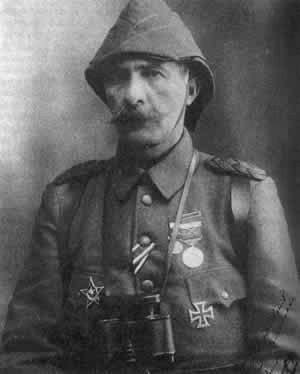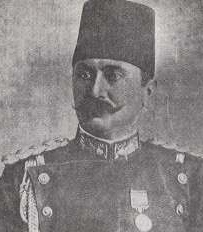<Back to Index>
- Lieutenant General of the Ottoman Army Mehmed Esat Pasha, 1862
- General of the Ottoman Army Abdullah Pasha, 1846
PAGE SPONSOR

Mehmed Esad Pasha (18 October 1862 - 2 November 1952), known as Mehmet Esat Bülkat after 1934, was an Ottoman general active during the First Balkan War, where he led the Yanya Corps, and in World War I, where he was the senior Ottoman commander in the Dardanelles Campaign.
Mehmed Esad was born into an Albanian family in Yanya (now Ioannina) on October, 18 1862, the son of Mehmed Emin Efendi, who had served as mayor of the city. His brother, Mehmed Vehib (1877 - 1940), also became a distinguished general.
Esad attended the Ottoman Military Academy, graduating in 1884. After a period of service in a regiment, he was selected for the Ottoman Military College in 1887, graduating as a General Staff officer in 1890. His excellent performance led to his immediate dispatch to attend the Prussian War Academy in Berlin, from where he graduated in May 1894. After a stint at the General Staff, he was promoted to Lt Colonel and given a teaching position at the War Academy. By the time the Greco - Turkish War of 1897 broke out, he had been promoted to Colonel, and he commanded a regiment during the war. In 1899, he was placed as head of training at the War Academy. In 1901 he was promoted to Mirliva (Brigadier) and to Ferik (Major General) in 1906. From 1907 he served as Chief of Staff of the Third Army at Thessaloniki.
In 1911, he commanded the 5th Regular (Redif) Division at Gallipoli for a short period before returning to Yanya to command the 23rd Regular Division. It was at this post that the outbreak of the First Balkan War found him. Esat was immediately detached from divisional command and placed in charge of the provisional Yanya Corps, tasked with defending the well fortified city and the wider region of Epirus. Esad succeeded in defending Yanya for several months against the Greek Army, but was finally forced to capitulate after the Battle of Bizani on 4-6 March 1913.
Esat remained in Greek captivity as a prisoner of war until 2 December 1913. His defense of Yanya however had earned him the status of a popular hero, as well as the honorific title of "Pasha". Almost immediately upon his return, on 10 December, he was appointed commander of the III Corps at Gallipoli, which he would lead into battle during the Gallipoli Campaign. The III Corps quickly established itself as one of the most combat worthy formations in the Ottoman army, as most of its units and soldiers had recent fighting experience in the Balkan Wars. It is indicative that when the Ottoman Army mobilized upon its entry in World War I, Esad's corps was the only one to do so within the prescribed time frame.
Although most accounts of the Battle of Gallipoli tend to focus on the role of Fifth Army's commander, German general Liman von Sanders, and on Mehmed Esad's subordinate, Mustapha Kemal Pasha (Atatürk), it was Mehmed Esad who prepared the Ottoman defenses during the battle, and who actively commanded the Ottoman army in the Gallipoli peninsula during the battle. In October 1915, Esad was appointed as CO of First Army, succeeding Colmar Freiherr von der Goltz, who was dispatched to the Mesopotamian front. In late 1917, Esad visited Germany and toured the German fronts. In February 1918 he was placed in command of the Fifth Army, and in June, of the Third Army on the Caucasus front. After the Armistice of Mudros, and until his retirement on 22 November 1919, he served as Inspector General of the mostly demobilized Second Army.
In 1920, Esad Pasha served as Navy Minister in the short lived cabinet of Hulusi Salih Pasha. In 1934, he adopted the surname "Bülkat". He died in Istanbul in 1952. A selection of his memories was published in 1975 under the title Esat Paşa'nın Çanakkale Anıları (Esat Pasha's Çanakkale Memoirs).

Abdullah Pasha or Abdullah Kölemen (1846 - 1937) was an Ottoman general in the First Balkan War, notable as the Ottoman commander in the Battle of Kirk Kilisse in 1912, the Battle of Lule Burgas, and the Battle of Adrianople (1913) in which the Ottoman forces were defeated by the Bulgarians.
He was the Minister of War (Turkish: Harbiye Nazırı) of the Ottoman Empire for 38 days between 11 November and 19 December 1918 in the cabinet of Ahmed Tevfik Pasha. He later resigned from the cabinet and joined the Turkish War of Independence where he fought against the Greeks in Smyrna. He died in 1937 in İzmir.